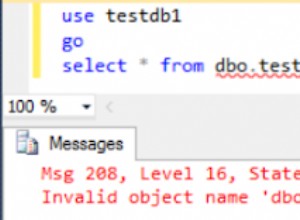अगर कोई भी ऐसा कुछ करना चाहता है, तो मैं पिछले पांच घंटों के भीतर वह कोड पोस्ट करूंगा जो मैंने लिखा और परीक्षण किया।
मैंने अपनी दो तालिकाओं को तीन में बदलने का फैसला किया, सभी आवर्ती विकल्पों को तीसरी तालिका में स्थानांतरित कर दिया:
'चर्चकाल_घटनाएं' - ईवेंट जानकारी के लिए अतिरिक्त फ़ील्ड हैं जिन्हें मैंने यहां शामिल नहीं किया है
+----+-----------+------------+------------+------------+-----------+
| id | name | date | starttime | endtime | recurring |
+----+-----------+------------+------------+------------+-----------+
| 1 | Event 1 | 2013-04-01 | 10:30:00 | 12:00:00 | 0 |
| 2 | Event 2 | | 14:00:00 | 15:00:00 | 1 |
| 3 | Event 3 | | 09:00:00 | | 1 |
| 4 | Event 4 | | 19:00:00 | 21:00:00 | 1 |
+----+-----------+------------+------------+------------+-----------+
'चर्चकाल_असाइन' - घटनाओं को उपयुक्त कैलेंडर में रूट करता है (क्योंकि वेबसाइट पर विभिन्न विभागों के लिए कैलेंडर होंगे)
+----------+-------------+
| event_id | calendar_id |
+----------+-------------+
| 1 | 1 |
| 2 | 1 |
| 3 | 1 |
| 4 | 1 |
+----------+-------------+
'churchcal_recur_events' - यहां हर घटना की पुनरावृत्ति के नियम दिए गए हैं
+----------+-----------+------------+----------------+------------+-------------+-----------+
| event_id | frequency | recur_type | recur_day_num | recur_day | recur_start | recur_end |
+----------+-----------+------------+----------------+------------+-------------+-----------+
| 2 | 1 | Week | NULL | Sunday | NULL | NULL |
| 3 | 2 | Week | NULL | Wednesday | 2013-04-01 | NULL |
| 4 | 2 | Month | third | Friday | 2013-04-01 | NULL |
+----------+-----------+------------+----------------+------------+-------------+-----------+
नया कोड (PHP) - यह एक दिन के लूप में है
//query all events
$get_events = db_query("SELECT * FROM {churchcal_events ce, churchcal_recur_events cre}
WHERE (MONTH(ce.date) = :month AND YEAR(ce.date) = :year AND DAY(ce.date) = :day) OR
(ce.id = cre.event_id AND ce.recurring = :recur AND cre.recur_day = :calendar_day)
ORDER BY starttime",
array(
':month' => $month,
':year' => $year,
':day' => $list_day,
':recur' => '1',
':calendar_day' => date('l', strtotime($month . '/' . $list_day . '/' . $year)),
));
foreach($get_events as $event) {
//see if events belong to this calendar
$calendar_assign = db_query("SELECT * FROM {churchcal_assign} WHERE event_id = :event_id AND calendar_id = :cal_id",
array(
':event_id' => $event->id,
':cal_id' => $cal_id,
));
if($calendar_assign->rowCount() > 0) {
//one-time events
if(($event->recurring != '1') && ($single_event_id != $event->id)) {
$calendar .= calendar_event($event->id, $event->name, $event->starttime);
$single_event_id = $event->id;
//$calendar .= $single_event_id;
}
//monthly recurring events
if(($event->recur_type == 'Month') && ($event->recurring == '1')
//day is on or before end date
&& (($event->recur_end >= date('Y-m-d', strtotime($month . '/' . $list_day . '/' . $year))) || ($event->recur_end == '0000-00-00') || ($event->recur_end == NULL))
//day is on or after start date
&& (($event->recur_start <= date('Y-m-d', strtotime($month . '/' . $list_day . '/' . $year))) || ($event->recur_start == '0000-00-00') || ($event->recur_start == NULL))
//day is equal to date of recurrence, i.e. first friday, third monday, etc
&& ($year . date('m', strtotime($year . '/' . $month . '/' . $list_day)) . $list_day == date('Ymj', strtotime($event->recur_day_num . ' ' . $event->recur_day . ' of ' . date('F', strtotime($month . '/' . $list_day . '/' . $year)) . ' ' . $year)))
//day is in agreement with month frequency, i.e. every month, every other, etc. from start date
&& ($month % $event->frequency == date('m', strtotime($event->recur_start)) % $event->frequency)) {
$calendar .= calendar_event($event->id, $event->name, $event->starttime);
}
//weekly recurring events
if(($event->recur_type == 'Week') && ($event->recurring == '1')
//day is on or before end date
&& (($event->recur_end >= date('Y-m-d', strtotime($month . '/' . $list_day . '/' . $year))) || ($event->recur_end == '0000-00-00') || ($event->recur_end == NULL))
//day is on or after start date
&& (($event->recur_start <= date('Y-m-d', strtotime($month . '/' . $list_day . '/' . $year))) || ($event->recur_start == '0000-00-00') || ($event->recur_start == NULL))
//day is in agreement with week frequency, i.e. every week, every other, etc. from start date
&& (date('W', strtotime($month . '/' . $list_day . '/' . $year)) % $event->frequency == date('W', strtotime($event->recur_start)) % $event->frequency)) {
$calendar .= calendar_event($event->id, $event->name, $event->starttime);
}
}
}
यदि आप इसे मेरे जैसे Drupal मॉड्यूल में नहीं बना रहे हैं, तो आप 'db_query ()' को अपने स्वयं के डेटाबेस क्वेरी फ़ंक्शन जैसे PHP के डिफ़ॉल्ट 'mysql_query ()';
से बदल सकते हैं।



